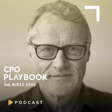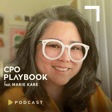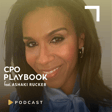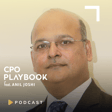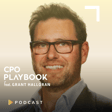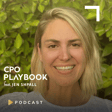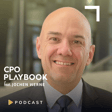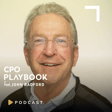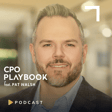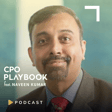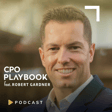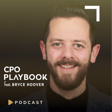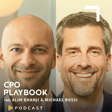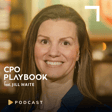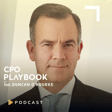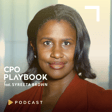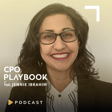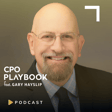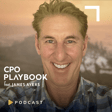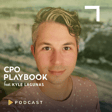Introduction to CPO Playbook
00:00:01
Speaker
I'm Felicia Shakiba, and this is CPO Playbook, where we solve a business challenge in every episode.
The Role of Social Media in Sales Enablement
00:00:14
Speaker
How do we best train our sales teams to leverage social media for their advantage? Of salespeople, only 31% say they use social media content for sales enablement. Yet social media continues to be a major vehicle for finding new prospects. In fact, 54% of social browsers use social media to research products.
00:00:36
Speaker
which means social media has become an indispensable tool for businesses and ultimately sellers. It offers a unique platform for companies to engage with their target audience, build brand awareness, and foster meaningful relationships with customers. With billions of users across various platforms, social media provides businesses with unparalleled reach.
00:00:57
Speaker
and the ability to tailor their marketing efforts to specific demographics.
Meet Tim Hughes, Social Selling Pioneer
00:01:02
Speaker
Our guest today is Tim Hughes, universally recognized as the world's leading pioneer and innovator of social selling. Tim, welcome to the show. Thank you. I'm really excited to talk to you. I am so excited to chat with you and learn more.
Transition to Social Selling
00:01:19
Speaker
And so my first question is, can you actually tell us about your background and
00:01:25
Speaker
how you transitioned from corporate sales to focusing on social selling? Yes, very quickly. I was in a corporate sales role and have been for 25 years. I'm a salesperson. And I was in this corporate sales role and I was selling accounting systems and I was getting bored of it. And my manager said, and this is 15 years ago, we need to get onto social media and changing the world. And I did and I really enjoyed it. And I suddenly thought, do you know, I quite fancy spending my life on social media
00:01:54
Speaker
helping people, transforming teams. And the company that I was working for very kindly laid me off. And the person who is my business partner, Adam Gray, and in the UK being laid off is not like giving a black bag and told to go away. You're actually giving quite a lot of money, which enabled us to set up the business.
00:02:13
Speaker
All kinds of things happened. In 2016, my first book came out. It was the first book on social selling. And we'll talk about how actually things, I was saying to my partner actually the other day, so that a lot of the things have come to me rather than me having to go out and get, and I can talk about that during the discussion that we're having.
Crafting a Buyer-Centric Social Profile
00:02:30
Speaker
I know that you mentioned the importance of building a buyer-centric profile on social media. Yes. Could you elaborate on what that entails and why is it important to the sales cycle? Yes. So the mistake that we always make, whether we're salespeople or we're in human resources or whatever, we think it's about us. And it's not. It's about the other person. It's about the candidate. It's about the buyer.
00:02:58
Speaker
And what we need to do if we're on social media is that we need to understand what that person is thinking and what they're looking for. And so when we put ourselves up out on social media, the first thing that we need to understand is that when people are looking at our profiles, they're jumping to conclusions about what you're doing. So for example, if your LinkedIn profile is a CV, the only conclusion I can jump to is that you're looking for a job.
00:03:24
Speaker
And so what we need to do is that we need to put or create a shop window to the world. So our LinkedIn profile, there's a billion people on LinkedIn, and they all walk past your LinkedIn profile every day. And what we want them to do is rather say, guys, another boring corporate profile.
00:03:44
Speaker
we want them to do is go, that's really interesting. Do you know, I think that person could help me. And we actually have clients where buyers are walking across social media and they're saying to the salesperson, senior profile, I think you can help us. Can you do that? And then that turns into a classic
00:04:01
Speaker
sales conversation. But we've got clients that are doing multi-million dollar deals purely by being on social media. Now that's a transformation from typical salespeople. When you see a salesperson, there's a joke about salespeople. How do you tell that a salesperson is lying? Their lips are moving. And that's the thing about salespeople. We don't like them. We don't trust them. And we know that if we talk to them, we're just going to end up as a line in the CRM system. And so what we're looking for are people that are different, that stand out.
00:04:30
Speaker
And there's a whole bunch of other things that we train and coach people in the way that search is different on social media. So how can you be found, et cetera, et cetera. But biocentric profile is a building block of what you need to do to be good on social. And how do you approach and maintain a wide and varied network on platforms like LinkedIn?
Building a Diverse Network and Social Selling
00:04:54
Speaker
The way that the people will find you is because they will be connected to you. So if you look at sales from a classic sales perspective, there's two ways of actually getting a sale. One is through Outbound, which is where I will contact you. And the classic thing that people do, everybody will have had this on LinkedIn, is that someone will have connected to you, you accept the connection of Christ, and then they send you a list of their products and services. That's spam. That's not what we would see as social selling.
00:05:20
Speaker
I'm going to answer your question, but I'm actually going to define what social selling is because I think it's important that people understand that. Because quite often they think social selling is selling on social and it's not. So I'm just going to read, I have to read it off the wall because I don't know this off my heart. So social selling is using your presence and behavior on social media to build influence, make connections, grow relationships and trust, which lead to conversations and commercial interaction.
00:05:48
Speaker
Now, conversations are really key because conversations create sales. So what we're trying to do is create a conversation. So go back to your question about network. Whenever we connect with somebody, what we do is we have the opportunity to have a conversation with that person because of the fact that I have a great profile.
00:06:06
Speaker
I happened to comment on one of your podcast posts. I thought that looks like an interesting podcast. I wonder if I can get on that. What I will do is I'm going to leave a comment on there, a supportive comment. You looked at that. You looked at my profile and thought Tim Hughes looks interesting. I think you then contacted me and said, would you like to come on my podcast?
00:06:27
Speaker
So I'm sitting here based on the processes that we put in place and that we help and train and coach people. The only way that I would have found you is either to be connected to you, and I was, or to be connected to somebody that you are connected to over the LinkedIn, and if you're using other channels as well, out through social media. We call this walking digital corridors and having digital conversations.
00:06:56
Speaker
So you build a network, you see each connection is an ability to have a conversation, and we train people in the way that they have those conversations. So ultimately, you will be in a situation where somebody will turn around and say, what do you do? Think of it as a networking event, but online.
00:07:13
Speaker
Yes, absolutely. But people can't or sellers can't be on social media all day, right? They have meetings, they're meeting with other clients, they're traveling. What is the recommended or suggested amount of time that people should be spending on social media to build that what you call influence? What does that day-to-day or week-to-week look like for them?
Optimal Time for Social Media in Sales
00:07:40
Speaker
So it's a very common question that we get, and my answer to that would normally be like 30 minutes or an hour. But I've been to customers where I say, so how did, you know, you say to somebody, so how did this morning go? And they say, well, I've wasted time. So what was that? So I was cold calling and I'd never get through to anybody and no one out returns my calls. It's like, okay, so why are you doing that?
00:08:01
Speaker
You know it doesn't work. We know social selling works, so why didn't you invest that three hours in social selling? Oh, I can't do that. Why not? Why would you do something that doesn't work versus something that does? Now, all of our team, all of my team, all we do is social sell. We've never placed an ad. We've never made a cold call. We don't have an email list.
00:08:22
Speaker
So all we do is social self. So I spend all of my time in social media. When you say 30 minutes, people say that's a long time. You go, okay, yes. But so there's a guy on LinkedIn called Simon Kemp. He creates a, every quarter, a, it's now 500 slides of the most up-to-date data on what is social media. How many people are on the internet? How many people are on social media? The average person
00:08:49
Speaker
So there are something like, there's five billion people on social media, 62%, that's 62% of the world's population. And the average person spends two hours, 23 minutes a day on social media. That five billion people are spending two hours, 23 minutes a day. Now, that's an average. So in the Philippines, they generally spend five hours a day on social media. Some people less, that gives you an average figure.
00:09:17
Speaker
As well as that, of course, some of that is posting pictures of your lunch or your fruit bowl or something like that, but also what 75% of the people are using it for brand research. Let's take the family to Iceland. That'll be really good. The first thing that you do is reach for your mobile.
00:09:34
Speaker
Right. Yeah. And you'd start searching. I mean, you wouldn't wait for someone to call you about Iceland. You just go and do it. And you search. I've sat in a cafe with my partner and she'll say, let's go because I live closer to Iceland than you do. And she'll say, let's go to Iceland for the weekend. And I'll say, OK, you search for the Airbnb's, I'll search for the flights. And we're sat there talking to each other, going through our mobiles with our mobiles doing searching. And that's how people buy today.
Shift in Buying Behavior to Online Research
00:10:00
Speaker
Now, what's happening also is that we're being conditioned in the way that we buy through to business to business. In the UK, I live in London, so a house could be a million dollars.
00:10:14
Speaker
I can go online and I can basically research a million dollar house. I can go to what you call a real estate person. Right. And we're conditioned in that and we're bringing that into business to business. So going out and buying a million dollar accounting system and actually doing most of the buying online isn't as seen as being normal.
00:10:33
Speaker
So Sixth Sense have just come out with this report that shows that people are now 70% of the way through the buying process before they contact a seller. And when they do contact a seller, they generally know who they're going to buy from. They've actually scored out and said, these are the products, these are the prices, these ones actually look like the right ones, or these are the wrong ones. And then they actually make those, they call into those vendors.
00:10:59
Speaker
So actually, by the time someone actually caught you, you may have already won or lost a deal. And this is what people don't understand that you need to have a position on social media because we know that our buyers are there. We need to have a bio-centric profile. So what happens is that people see us as somebody that can help us. We need to have a wide and varied network because we need to be connected to the people that we want to influence and the people that are going to buy.
00:11:27
Speaker
because what we're trying to do is influence the early stage of the sale because people are doing all of this research and you said, oh yeah, of course people do it. BMW is a car of ours. When a buyer walks through the door of the showroom, they know that buyer will know more about the car they want to buy than the salesperson.
00:11:48
Speaker
So they've retrained their salespeople, not to say, well, it's got GPS and it's got electric windows and stuff. What they do is that they actually have trained the salespeople to say, if you buy this model rather than that model, it doesn't depreciate as fast. And you're only losing five brake horsepower, but you're never going to use that on the freeway anyway. What they're doing is that they're actually enabling the person to buy rather than saying, this is how sales and marketing has changed.
00:12:17
Speaker
Another example is, I was actually writing on my blog for tomorrow. You just have the Super Bowl. And there's all these adverts that take place. And what do we remember about the adverts? Well, actually, in three months, we don't remember it. It was a state farm ad. We'll remember it was Arnold Schwarzenegger. And the thing is that we don't remember the brand anymore. This is about people. And social has changed the landscape that is not about brands anymore.
00:12:47
Speaker
It's about you. If I'm connected to you, I have a relationship with you. If you say to ring me up tomorrow and say, Tim, I've got this great opportunity. I'm going to go and work for IBM. Fantastic. What we've done is that relationship moves to IBM, the company that you're working for at the moment. I never knew what it was anyway.
00:13:05
Speaker
This is the landscape that's taking place and the transformation that's taking place. And this is just accelerating. You mentioned something about how we train salespeople, and I'm going to come back to that. But first, in your book, you highlighted the significance of creating insightful content for social media. Can you share some strategies for creating engaging content that resonates with the target audience?
Creating Resonant Content and Human Connection
00:13:31
Speaker
Yeah, so we've done research about what content works and what content doesn't work. And it's really back to the fact that people come to social media because they want human content, contact. They want to have a conversation. They don't come to social media to read brochures. And in fact, the research from Sixth Sense actually says, don't waste your time getting your employees to post brochures or white papers on social media, because buyers can get those from your website.
00:13:59
Speaker
And we all know what brochures and white papers say. They say, buy my product because it's great. When we go to a website, we'll know that the website will say, we're the best in the world. And you want to buy our product. Every single website says,
00:14:12
Speaker
We just filter this stuff out. What we're looking for is this human to human contact, which is your network loves you. Your network loves you and the content that you're putting out. They're looking for insight. Tell me something about the CPO process that I don't know already. Tell me all of the things that this particular podcast actually stands for. We're looking for that insight. We're looking for an expert that's gonna tell us, that's gonna help us.
00:14:38
Speaker
And so what we need to be doing is that we need to be providing that insight. We need to be sharing content where people go, that's interesting. Because when we pick up our mobiles and we go down the timeline, we go boring, boring, boring, boring, boring, boring. Oh, that's that podcast. I really like that. Oh yeah, I'm going to make time to actually watch that.
00:14:58
Speaker
We're looking for that insight. We're looking for those particular people that can actually provide that insight. And what we're also looking for is a human element to it. And our research shows, because we've gone onto LinkedIn and looked at particular content, and certain content has, you know, so many likes and comments. And I suggest everybody does this because they can A-B test this.
00:15:24
Speaker
tomorrow, put out a post on LinkedIn of a brochure of your company and see how many likes and comments you got. The next day, put out a post which is you, photo of you holding up a brochure and see how many likes and comments you get. And what you'll find is the picture of you holding up the brochure will get more likes and comments. Because as a network, we're interested in you and who you are and what you do and what you say.
00:15:52
Speaker
we're not interested in corporate propaganda from some sort of company. So anybody can do that. And if I'm wrong, please come to me and tell me. I say this on podcasts and people have never come to me and say that. So what we're looking for is lab content. So my blog tomorrow is about the Super Bowl ads and the fact that it's not about advertising, it's about the people.
00:16:12
Speaker
We remember it's Jennifer Lopez. We remember that it's Demi DeVito. And what I'm providing is a very snackable piece of content, which people can read in 10, 20 seconds. But what they do is, yeah, that's Tim Hughes. Oh, yeah, he's that's interesting. Oh, yeah, he's that social selling guy. And what happens is that I'm constantly waving to people across the Internet.
00:16:35
Speaker
And when they're looking for someone to come in and help transform their salespeople to using social selling, they'll go, who's that guy? Oh yeah, he does that interesting content. He did that one about the Super Bowl and Danny DeVito and Tim Hughes. That's it. Tim Hughes. I'm actually, what I'm doing is I'm making sure that people know who I am. They know who the expert I am, what I stand for, and I'm waving them to them every day.
00:16:58
Speaker
What would you say to someone who might be a little bit shy or reserved from exposing themselves or their personal lives or, I don't want to take a picture because I don't want this funny background in my house,
Social Media Tips for Introverts
00:17:14
Speaker
right? I mean, most people, some people work from home. So what would you say to that salesperson? So I'm an introvert.
00:17:22
Speaker
though I don't often come across as one. This is not about... The thing is that when you share a brochure, if someone says, that's rubbish, you can say, yeah, it's just a brochure. It's the company I work for. I'm going to leave them in three months anyway. Whereas if you're sharing a picture of yourself, people think, and someone says, you look rubbish or your background is rubbish. Oh, well, you would be offended. The thing is that people don't do that.
00:17:51
Speaker
people know there's a kind of unwritten rule on LinkedIn that if you're sharing stuff about yourself, someone may actually say, it's interesting that you've got avocados in your fruit bowl. And that may be a comment, but they won't say you look stupid. Nobody does that. And the other thing about social media, what you've got to remember is that you can block these people. You are in total control of who your network is and who is and the conversations you have.
00:18:19
Speaker
If you want to, you can report to LinkedIn as well. So, what I would always recommend, especially to people that think that they're shy or they're introverted, is to try taking... This is the place where I like to go hiking. These are the woods where we go walking. This is the place that we take the children. They really love it here. And think about those things, or this is the bakers that I go. This is my favorite Danish pastry. Now,
00:18:46
Speaker
What you're not necessarily doing is saying that it's not something about you, but there again it is. If you're going and saying, this is my, on Thursdays, my parents have my children. And one of the things I do is I go out and I go and sit in the coffee shop and I buy a latte and I just sit there in silence. And what I find is, is something that really inspires me.
00:19:10
Speaker
and it just enables me to clear my head and I'm just sitting there in a moment. That's not sharing anything private about you. It's not unprofessional.
00:19:20
Speaker
It is sharing something about you and what you'll probably get is people coming on, yeah, I'm a Marlin. That moment of silence is so important. And someone says, I prefer a flat white rather than a latte or whatever it is. But what they're doing is if they're commenting and liking your posts, what they're sharing is that they have a digital resonance with you. Wonder if we could connect.
00:19:42
Speaker
That's all it is, you're not asking for anything else. And from a sales perspective or a CPO perspective, it could be because what this is doing is that you're looking for your future employees. It's not just about sales. But what we're doing by using that content is that we're creating that connection.
00:20:00
Speaker
And that's just an idea. I mean, I can take you through lots of different, if we've got time at the end, I'll take you through another example of content. And you're talking about employer branding. Yes, so yeah, but employee branding quite often is seen as being, what we're going to do is we're going to buy a piece of software, and we're going to take the brochures and the white papers that people aren't reading on any of the other places, and we're going to push those out.
00:20:25
Speaker
So it's still quite often employer branded is still seen as we're going to stand on the top of the building and we're going to get a megaphone and we're going to shout out how brilliant we are. And no one's interested. It's about employer branding. It's about empowering the employees with guardrails to understand how they can go out onto social media, look interesting, build networks and share content that actually people will engage with and go,
00:20:53
Speaker
That looks really interesting. So we have a client that creates desktop terminals in Cambridge in the UK. They don't spend any money on job adverts or recruitment consultants anymore. They've cut that completely from their budget because they're totally online.
00:21:09
Speaker
And people are going, that's really interesting. Oh, you do that as you've got a woman's group. You're doing that around diversity. That's really interesting. And what they're doing is that they're taking their culture and they're putting it online. And we all know that the employees that are going to stay the longest and probably give you the most of their time are the ones that are going to walk toward you and say, I want to come and work for you, rather than necessarily somebody that's got a CV.
00:21:36
Speaker
So what we're doing is that we're seeing this transforming not just in the sales, but right across the whole of the enterprise. Could you walk us through the process of training salespeople on how to best do
Training Sales Teams in Social Selling
00:21:48
Speaker
this? What we're doing is we're teaching people something new. And whenever people learn something new, they have to have time to actually think about these things.
00:21:57
Speaker
So there's new concepts about the biocentric profile. What does that mean? Writing in a different way rather than writing in this business gibberish. I'm a results orientated. Yeah, we're all results orientated. We're all highly energetic and it's meaningless.
00:22:13
Speaker
What we want to do is that when we see someone's profile, we want to see the story of what they are. People say to me, I'm passionate about digital transformation. And I say to them, so 3 o'clock on a Saturday afternoon, you're really passionate about digital transformation. They say, now I'm watching the kids play football. OK, so you're not passionate about digital transformation, are you? You're passionate about your kids playing football. And so what we do is that we teach people how to write in a way that actually is interesting to the buyer.
00:22:41
Speaker
We also take them through about how to grow a network that's connecting to people without spamming people. And usually in that session, we actually see them getting meetings. So even though it's a 12-week program, people think that we don't get a return on investment until 12 weeks, we actually generally get a return usually by about week three when we start teaching people to get the meetings.
00:23:02
Speaker
We then show people how to talk about the keywords of how they need to be found, how they can be found, how they can go out and have conversations. So you have to go out into posts and say, your podcast sounds really interesting, et cetera, et cetera, starting conversations, joining conversations. And the last thing that we do is that we teach them how to create content and everybody writes a 300-word blog.
00:23:25
Speaker
And the whole of the process is certified by the Institute of Sales Professionals, which is a sales trade body here in the UK. It's the only independently certified social selling program in the world.
Actionable LinkedIn Tips for Sellers
00:23:38
Speaker
And given that 12-week program, what three things can people do or sellers do right now that will help? So the first thing is I'm going to tell you some things, and I've already told you some things.
00:23:54
Speaker
knowing and doing are two different things. So I can tell you this stuff and you're gonna know it, but I can guarantee you that you won't do it. And it's important that what people do when they take away from this is the fact that they actually go and do it. So the first thing that you need to do is you need to have a biocentric profile. And one of the things that you can look at that is your summary title on your LinkedIn profile is the most visible thing about you on the internet.
00:24:20
Speaker
If I Google your name, unless you've got your own blog or website, because Google loves LinkedIn, because it's full of content, Google your name, I will see your photo, your name, and that summary title. Your job is to get someone to come and look at your profile in more detail. Because what you're trying to do is if whatever product or whatever service that you sell, you want to get someone to go, Oh, that's really interesting. I've never thought about that.
00:24:46
Speaker
Yeah, we need to get some people in around that and I'll contact you. So if you've got your title, which is head of tax at Beaton's group or something like that, you're going to sound desperately boring. Or the other thing that people do is what's called the pipes thing, which is where they've been told by some LinkedIn trainers to basically put
00:25:05
Speaker
keywords in it. So it will say podcast, author, speaker, TEDx, xGoogle, xFacebook, or whatever. I mean, all it does is it just looks for the buyer, it just looks like a blur. So I would ask anybody who, if you're interested in this, come and have a look at my LinkedIn profile. I'm Timothy Hughes or Tim Hughes, search for me and social selling as well and you'll find me and you'll see that I have a very different summary title than anybody else.
00:25:35
Speaker
And what is that? My summary title is, should have played Quidditch for England. What happens when they read it, people come to me and go, wow, I had to come and look at your profile because I read your title. And then I had to come and have a look at your LinkedIn profile. And I actually have a spelling mistake right at the end of my LinkedIn profile on purpose, because some people say, come back to me and say, you do realize you spell experience wrong. And I'll go, yes. And I know that you've just read my LinkedIn profile the whole way, all the way through.
00:26:01
Speaker
The thing about your summary title, this is about creating a conversation. This is about getting people to come and look at your profile. This is about getting people to understand that you are the expert that they're looking for. Now, if you have professional edition of LinkedIn and above, then LinkedIn shows you who's looked at your LinkedIn profile.
00:26:20
Speaker
So that means that you're able to go back to those people and say, you looked at my LinkedIn profile, have you found what you were looking for? Can we connect? And then when we connect, you say, thanks for looking at my LinkedIn profile. Was there anything actually that you were looking for? Quite often people come back and say something like, oh yeah, we're actually looking for a speaker for ourselves, but would you be interested? And I'll convert 25% of the people that look at my LinkedIn profile to business.
00:26:45
Speaker
purely by going through this step-by-step process. Now, your story title needs to be your why, not your what. Lots of all LinkedIn trainers basically say it should be your what, it shouldn't be. It needs to be your why is it that you do something? Because what you're trying to do is, I get lots of people connecting to me saying, I help CEOs with their fitness and I just go ignore, because I know what's going to happen.
00:27:09
Speaker
you're just going to pitch to me. Or I help CEOs with their accounting and I just ignore it because I've got an accountant already. Now, they may be the best accountant in the world. I won't know that because you're trying to pitch to me. So I'll tell you about this piece of content. So this is just an idea. So a person that worked for me basically put out a piece of content and they said, my wife and I, we love Led Zeppelin.
00:27:36
Speaker
And whenever on a Friday night, my wife puts on Led Zeppelin. And I know as soon as I hear it through the door of my office, it's the time that I need to finish up what I'm doing and go enjoy the family for the weekend. What's your favorite Led Zeppelin song? People would put in when the levee breaks and stay where the heaven and whole lot of love and Kashmir, which is my favorite. And then on Monday, what he did was that all the people that he wasn't connected to, he basically sent her a message saying,
00:28:06
Speaker
Hey, thanks for your message. Yeah, I love when the levy breaks. It's really brilliant. Led Zeppelin 4 is just a fantastic album. Can I connect? And all the people that he was connected to, he sent a message to saying, yeah, thanks for the message about Led Zeppelin. Yeah, I really love Misty Blue Mountain. It's a really... We clearly have a lot in common. Why don't we have a conversation and get together on the call? So what we've done is that we've used a piece of content, which is, it's not unprofessional.
00:28:32
Speaker
It's actually something which is that people are interested in. We learn something about that person. But also at the same time, what we've done is that we've connected to a whole bunch of people that have shown that they have a digital resonance with us because they're saying, we like Led Zeppelin.
Engaging Content Strategies and Audience Connection
00:28:49
Speaker
And what we've done is that we've teed up a whole load of meetings with people with Led Zeppelin fans. Now, the way that you run that meeting, I don't have time to have to go into that, but you run that meeting in a particular way where you don't go on a pitch.
00:29:02
Speaker
But that's just an example of where I'm hoping that I can spark people's imagination about how they can use content in a way that will actually generate a network and conversations for them. Tim, everything that you've shared today has been so insightful, so eye-opening.
Conclusion and Call to Action
00:29:21
Speaker
Thank you so much. Where can people find you?
00:29:25
Speaker
So they can find me on LinkedIn. I'm Timothy or Tim Hughes. If you search on that on social selling and there's also my book, which I'm holding up though, nobody can see it. And my book is social selling techniques to influence buyers and change makers. It's the second edition, the one with the yellow cover. And I completely re rewrote the one in from 2016. And that second edition came out in 2022.
00:29:52
Speaker
Thanks so much, Tim. Thank you. That's Tim Hughes, CEO and co-founder of DLA Ignite. If today's episode captured your interest, please consider sharing it with a friend or visit cpoplaybook.com to read the episode or learn more about leadership and talent management. We greatly appreciate your rating, review and support as a subscriber. I'm Felicia Shakiba. See you next Wednesday and thanks for listening.

